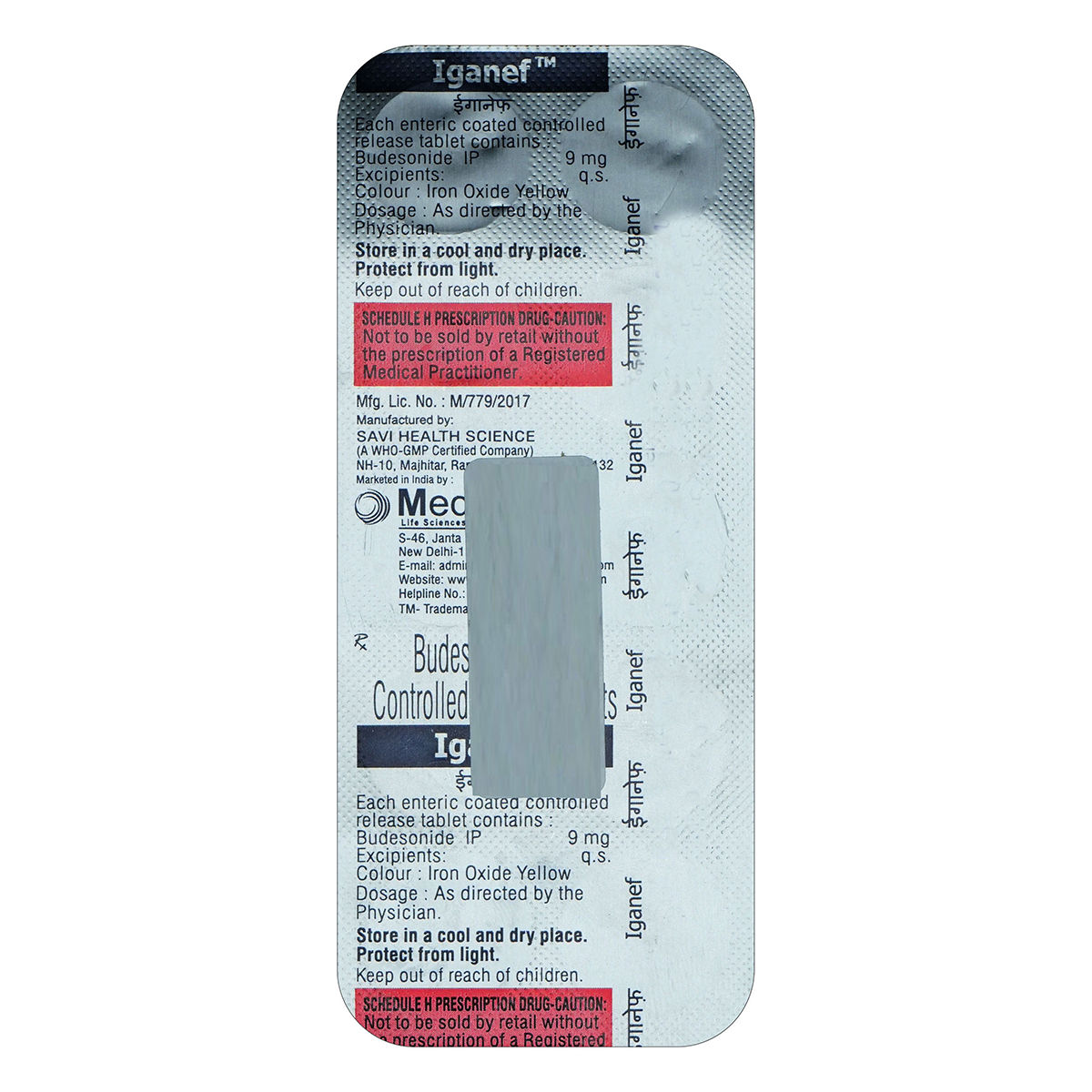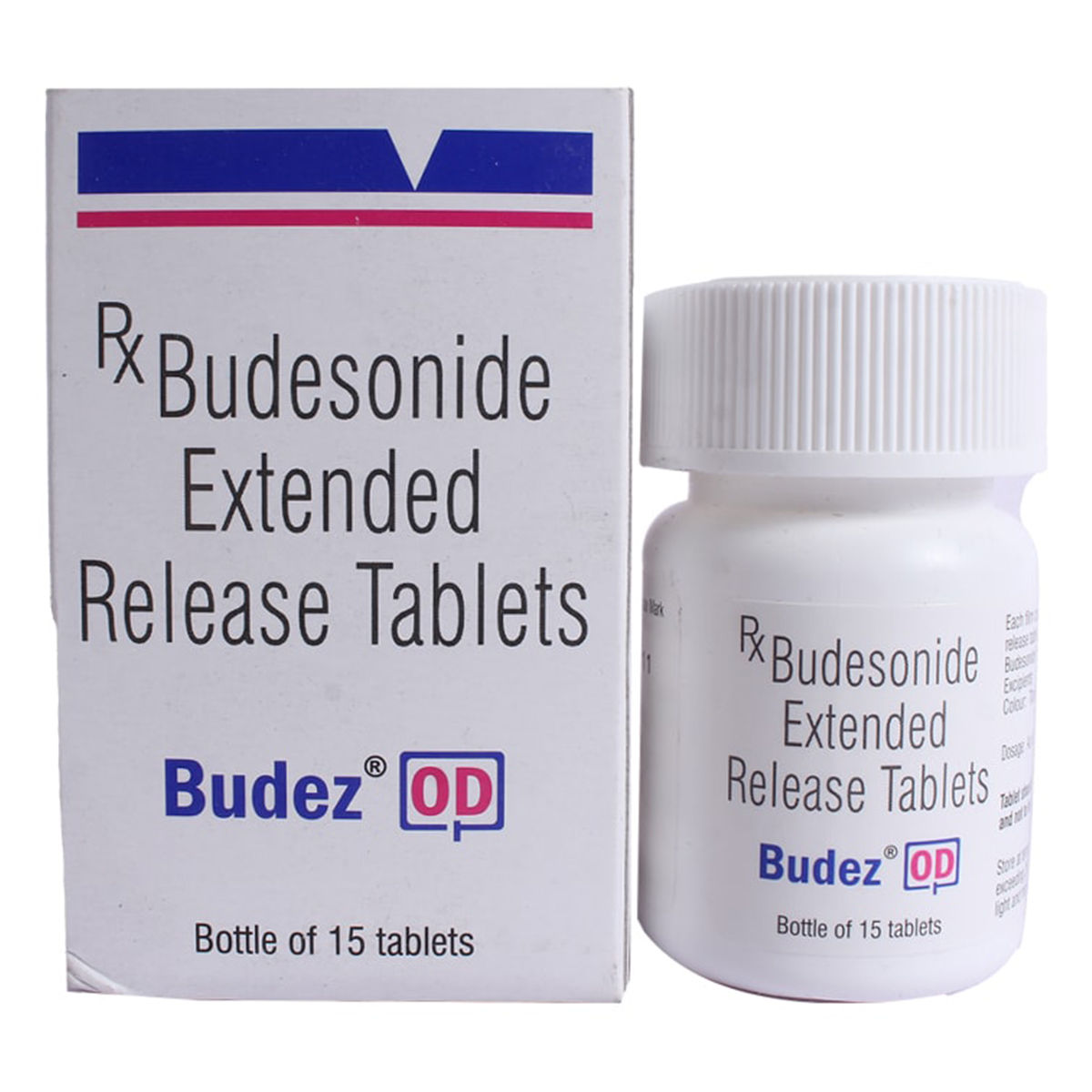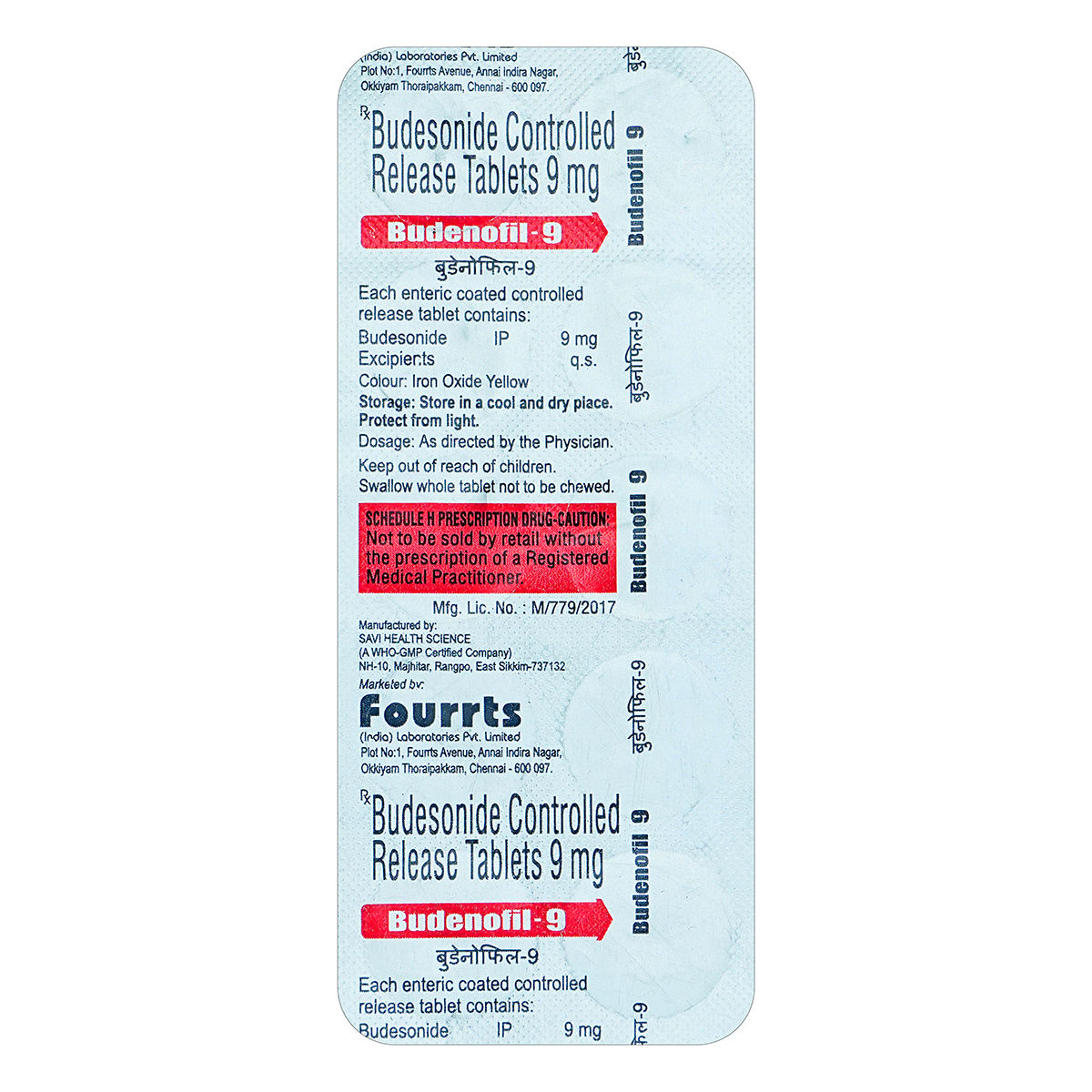Igbuda Tablet 10's

₹413.1*
MRP ₹459
10% off
₹390.15*
MRP ₹459
15% CB
₹68.85 cashback(15%)
Free Delivery
With Circle membership
(Inclusive of all Taxes)
This offer price is valid on orders above ₹800. Apply coupon PHARMA10/PHARMA18 (excluding restricted items)
Know Your Delivery Time
Provide Delivery Location
Available Offers
 Prescription drug
Prescription drugWhats That

Secure Payment

India's Most Trusted Pharmacy

Genuine Products
Composition :
Manufacturer/Marketer :
Consume Type :
Return Policy :
Expires on or after :
About Igbuda Tablet 10's
Igbuda Tablet 10's is used to treat inflammatory bowel diseases like Crohn's disease and ulcerative colitis. Crohn's disease is a chronic disease caused by the inflammation of the lining of the digestive tract. Ulcerative colitis is a condition that causes inflammation of the large intestine and rectum.
Igbuda Tablet 10's contains 'Budesonide' that works by reducing the body's natural defence response. Thus, it reduces inflammation in the digestive tract. It may also decrease symptoms, such as pain and diarrhoea.
Your doctor will decide the duration of Igbuda Tablet 10's based on your medical condition. The common side effects of Igbuda Tablet 10's include headache, dizziness, nausea, vomiting, stomach pain, bloating, tiredness, stuffy nose, sneezing, sore throat, and back or joint pain. Most of these side effects of Igbuda Tablet 10's do not require medical attention and gradually resolve over time. However, if the side effects are persistent, please consult your doctor.
Inform your doctor in advance if you have any allergic reactions to Igbuda Tablet 10's or any other medications. Brief your medical history to the doctor if you have any heart, liver or kidney diseases, glaucoma, cataracts, tuberculosis, high blood pressure, osteoporosis, stomach ulcer, and a weak immune system. Check with your doctor before starting Igbuda Tablet 10's if you are pregnant or breastfeeding. Igbuda Tablet 10's may cause dizziness; hence, avoid driving and alcohol intake while being treated with it. Igbuda Tablet 10's should be used in children above eight years of age only when advised by a doctor.
Uses of Igbuda Tablet 10's
Directions for Use
Medicinal Benefits
Igbuda Tablet 10's belongs to the class of medicines called 'glucocorticosteroids' used to treat inflammatory bowel diseases like Crohn's disease and ulcerative colitis. Igbuda Tablet 10's works by reducing the body's natural defence response. Thus, it reduces inflammation in the digestive tract. It may also decrease symptoms, such as pain and diarrhoea. It reduces irritation and swelling in the intestines.
How Igbuda Tablet 10's Works
Storage
Side Effects of Igbuda Tablet 10's
- Headache
- Dizziness
- Nausea
- Vomiting
- Stomach pain
- Bloating
- Tiredness
- Stuffy nose
- Sneezing
- Sore throat
- Back or joint pain
What if I have taken an overdose of Igbuda Tablet 10's
Drug Warnings
Please inform your doctor if you use any prescription, or non-prescription medicines, including vitamin and herbal supplements, before using Igbuda Tablet 10's. Let your doctor know if you have a recent history of heart, liver or kidney diseases, glaucoma, cataracts, tuberculosis, high blood pressure, osteoporosis, stomach ulcer, and a weak immune system before starting Igbuda Tablet 10's. Pregnant and breastfeeding women should use Igbuda Tablet 10's with proper consultation and caution. Igbuda Tablet 10's may make you dizzy; hence drive or operate machinery only when you are alert. Avoid consuming alcohol along with Igbuda Tablet 10's as it may worsen side effects. Igbuda Tablet 10's is recommended in children above eight years of age only with a doctor's advice.
Drug-Drug Interactions
Drug-Drug Interactions
Login/Sign Up
Using mifepristone together with Igbuda Tablet may significantly reduce the effects of Igbuda Tablet.
How to manage the interaction:
Taking Igbuda Tablet with Mifepristone is not recommended as it can cause an interaction, but it can be taken if prescribed by the doctor. Do not stop using any medications without talking to a doctor.
Coadministration of Igbuda Tablet and Ribociclib may increase the absorption of the medication from Igbuda Tablet into the blood stream.
How to manage the interaction:
Taking Ribociclib with Igbuda Tablet can cause an interaction, consult a doctor before taking it. Consult a doctor if experience swelling, weight gain, high blood pressure, high blood glucose, muscle weakness, depression, acne, thinning skin, stretch marks, easy bruising, bone density loss, cataracts, menstrual irregularities, excessive growth of facial or body hair, and abnormal distribution of body fat, especially in the face, neck, back, and waist. Do not stop using any medications without talking to a doctor.
Co-administration of Desmopressin with Igbuda Tablet may increase the risk of hyponatremia (low levels of salt in the blood).
How to manage the interaction:
Co-administration of Igbuda Tablet along with Desmopressin can lead to an interaction, it can be taken if recommended by a doctor. However, if you experience loss of appetite, headache, nausea, vomiting, lethargy (very tired), irritability, difficulty concentrating, weakness, unsteadiness, memory impairment, confusion, muscle spasm, decreased urination, and/or sudden weight gain, contact the doctor immediately. Do not discontinue the medication without consulting a doctor.
When Igbuda Tablet is taken with Idelalisib, may considerably enhance Igbuda Tablet absorption into the bloodstream which may lead to side effects.
How to manage the interaction:
Co-administration of Igbuda Tablet along with Idelalisib can lead to an interaction, it can be taken if recommended by a doctor. However, if you experience swelling, weight gain, high blood pressure, high blood glucose, muscle weakness, depression, acne, thinning skin, stretch marks, easy bruising, bone density loss, vision problems, menstrual irregularities, excessive growth of facial or body hair, and abnormal distribution of body fat, especially in the face, neck, back, and waist, infections, a severe asthma attack, consult the doctor immediately. Do not stop using any medications without talking to a doctor.
Using baricitinib together with Igbuda Tablet may increase the risk of serious infections.
How to manage the interaction:
Taking Igbuda Tablet along with baricitinib can lead to an interaction, it can be taken if recommended by a doctor. If you experience fever, chills, diarrhea, sore throat, muscular pains, shortness of breath, blood in sputum, weight loss, red or irritated skin, body sores, and discomfort or burning while urinating, severe stomach pain, nausea, or vomiting, consult a doctor. Do not discontinue any medication without consulting a doctor.
Taking Igbuda Tablet with Vigabatrin, especially for a prolonged period of time, may raise the chance of significant adverse effects (loss of vision).
How to manage the interaction:
Co-administration of Igbuda Tablet along with Vigabatrin can lead to an interaction, it can be taken if recommended by a doctor. Regular eye check ups are advised. Do not discontinue any medications without consulting a doctor.
Taking Igbuda Tablet with certinib, may increase the blood levels of Igbuda Tablet.
How to manage the interaction:
Co-administration of Igbuda Tablet along with certinib can lead to an interaction, it can be taken if recommended by a doctor. However, if you experience swelling, high blood pressure, high blood glucose, muscle weakness, depression, acne, thinning skin, stretch marks, bruising, vision problems, menstrual irregularities, excessive growth of facial or body hair, and abnormal distribution of body fat, especially in the face, neck, back, and waist, infections, a severe asthma attack, consult the doctor immediately. Do not stop using any medications without talking to a doctor.
When Igbuda Tablet is taken with Nefazodone, may considerably enhance Igbuda Tablet absorption into the bloodstream which may lead to side effects.
How to manage the interaction:
Co-administration of Igbuda Tablet along with Nefazodone can lead to an interaction, it can be taken if recommended by a doctor. However, if you experience swelling, weight gain, high blood pressure, high blood glucose, muscle weakness, depression, acne, thinning skin, stretch marks, easy bruising, bone density loss, vision problems, menstrual irregularities, excessive growth of facial or body hair, and abnormal distribution of body fat, especially in the face, neck, back, and waist, infections, a severe asthma attack, consult the doctor immediately. Do not stop using any medications without talking to a doctor.
When Igbuda Tablet is used with teriflunomide, the risk of severe infections increases.
How to manage the interaction:
Co-administration of Igbuda Tablet along with teriflunomide can lead to an interaction, it can be taken if recommended by a doctor. However, if you develop a fever, chills, diarrhea, sore throat, muscular pains, shortness of breath, blood in sputum, weight loss, red or irritated skin, body sores, or discomfort or burning during urination, consult a doctor as soon as possible. Do not discontinue any medications without consulting a doctor.
Using tofacitinib together with Igbuda Tablet may increase the risk of serious infections.
How to manage the interaction:
Co-administration of Igbuda Tablet along with tofacitinib can lead to an interaction but can be taken together if prescribed by a doctor. However, consult a doctor if you experience fever, chills, diarrhea, sore throat, muscle aches, shortness of breath, blood in phlegm, weight loss, red or inflamed skin, body sores, and pain or burning during urination. Do not discontinue any medications without consulting a doctor.
Drug-Food Interactions
Drug-Food Interactions
Login/Sign Up
Diet & Lifestyle Advise
Manage stress and sleep for at least six to eight hours to rejuvenate your body.
Maintain a fibre-rich diet and include healthy carbohydrates from fruits, vegetables and whole grains to maintain your blood glucose levels.
Avoid smoking and alcohol consumption.
Eat at regular intervals.
Keep a check on your weight and exercise regularly to maintain a healthy weight.
Habit Forming
Therapeutic Class
Igbuda Tablet 10's Substitute

Iganef 9 mg Tablet 10's
by Others
₹40.50per tabletCortiment Mmx 9 mg Tablet 10's
by Others
₹252.60per tabletBudez OD Tablet 15's
by Others
₹51.00per tabletBudenofil-9 Tablet 10's
by Others
₹39.24per tabletRafacol Tablet 10's
by AYUR
₹48.96per tablet
Product Substitutes
Alcohol
Caution
Avoid taking alcohol while using Igbuda Tablet 10's since it may worsen the side effects.
Pregnancy
Caution
Please consult your doctor before using Igbuda Tablet 10's if you are pregnant or planning to conceive. Your doctor will weigh the benefits and potential risks before prescribing Igbuda Tablet 10's.
Breast Feeding
Caution
Igbuda Tablet 10's may be excreted into the breast milk. Please consult your doctor before starting Igbuda Tablet 10's if you are a nursing mother.
Driving
Caution
Igbuda Tablet 10's may make you feel dizzy. In such cases, do not drive or operate machinery until you feel better.
Liver
Caution
Igbuda Tablet 10's should be used with caution in patients with liver diseases. Let your doctor know if you have any history of liver diseases or hepatic impairment.
Kidney
Caution
Igbuda Tablet 10's should be used with caution in patients with kidney diseases. Let your doctor know if you have any history of kidney diseases.
Children
Caution
Igbuda Tablet 10's is recommended in children above eight years of age only with a doctor's advice.
FAQs
Country of origin
Manufacturer/Marketer address
Disclaimer
Author Details
We provide you with authentic, trustworthy and relevant information















